May 20, 2025 | 09:09 GMT +7
May 20, 2025 | 09:09 GMT +7
Hotline: 0913.378.918
May 20, 2025 | 09:09 GMT +7
Hotline: 0913.378.918

The mountain peaks in Tram Tau, shrouded in clouds throughout the four seasons, provide ideal conditions for the Shan Tuyet tea plants to thrive. Photo: Thanh Tien.
In late March 2025, I arrived in Phinh Ho, a remote commune in Tram Tau district, Yen Bai province, to uncover the story of the centuries-old Shan Tuyet tea trees and the promising journey of bringing this rare tea product to international markets.
On an old motorbike, Sung A Tua, a young official from the commune who is quite popular on the social media platform TikTok, took me on a journey to conquer the Chi Lu mountain peak. We navigated winding, steep slopes, tracing the ridges of the mountains, with the temperature dropping the higher we climbed. After half an hour of uphill riding, around 10 a.m., we reached the land of ancient tea trees, with clouds still hanging thickly like a soft white silk veil embracing the towering mountain peaks.
Chi Lu mountain peak is considered the "roof" of the Phinh Ho tea region. Here, I witnessed firsthand a grove of majestic and towering Shan Tuyet tea trees, standing silently amidst the clouds and sky.
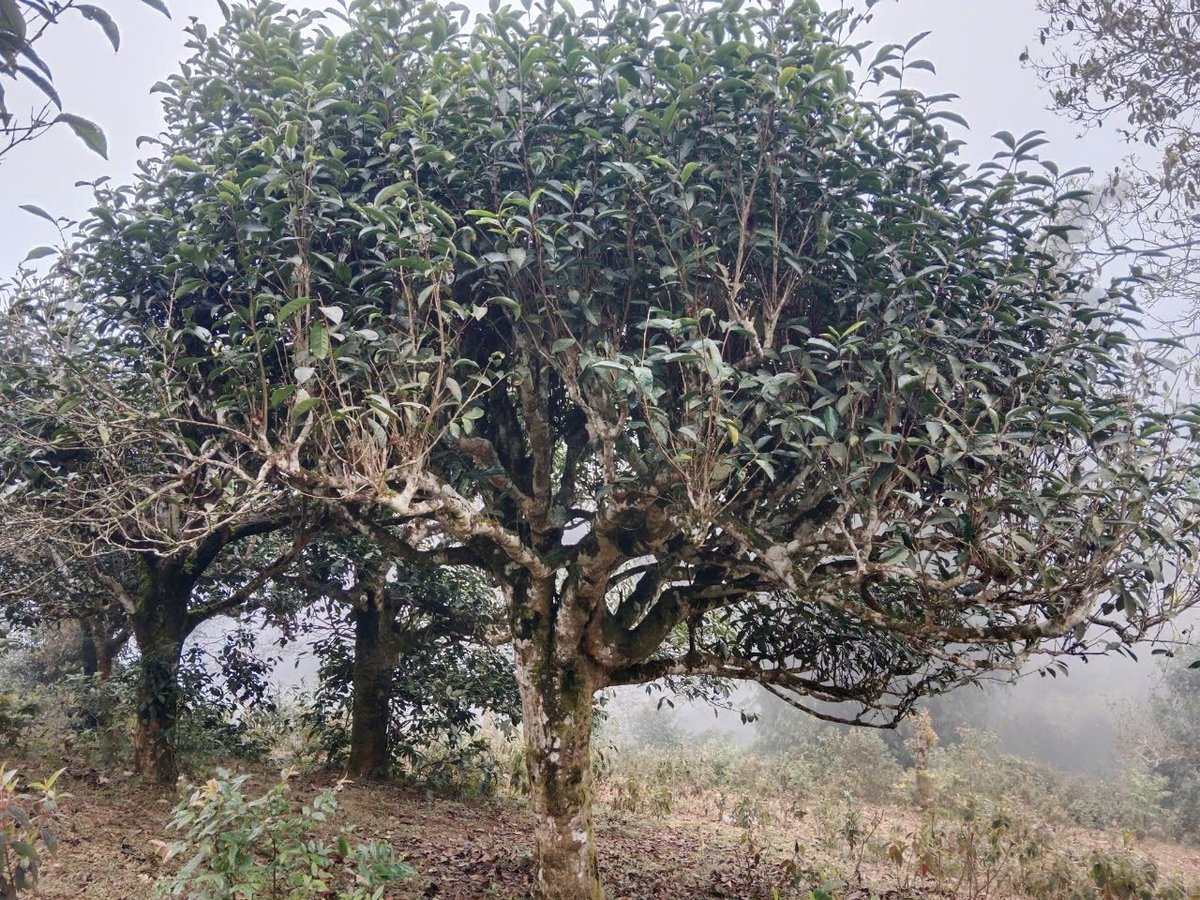
The centuries-old ancient tea trees are protected by the locals. Photo: Thanh Tien.
According to the locals, these ancient tea trees are between 200 and 300 years old, with some trees even older. Some of the larger trees have trunks so thick that an adult person cannot wrap their arms around them. The bark is rough, bearing the marks of time and the harshness of nature. This precious tea region grows at an altitude of over 1,000 meters above sea level, covered in dense mist year-round. It is this unique natural environment that has created the ideal conditions for the Shan Tuyet tea tree to develop naturally and purely.
After the cold winter months, as the land transitions into spring, the Shan Tuyet tea trees sprout fresh, vibrant buds with exceptional quality that few other types of tea can match. Standing amidst the ancient tea groves, breathing in the fresh air, and watching the young tea buds stretch toward the sun, one can clearly sense the priceless value that nature has bestowed upon this land.
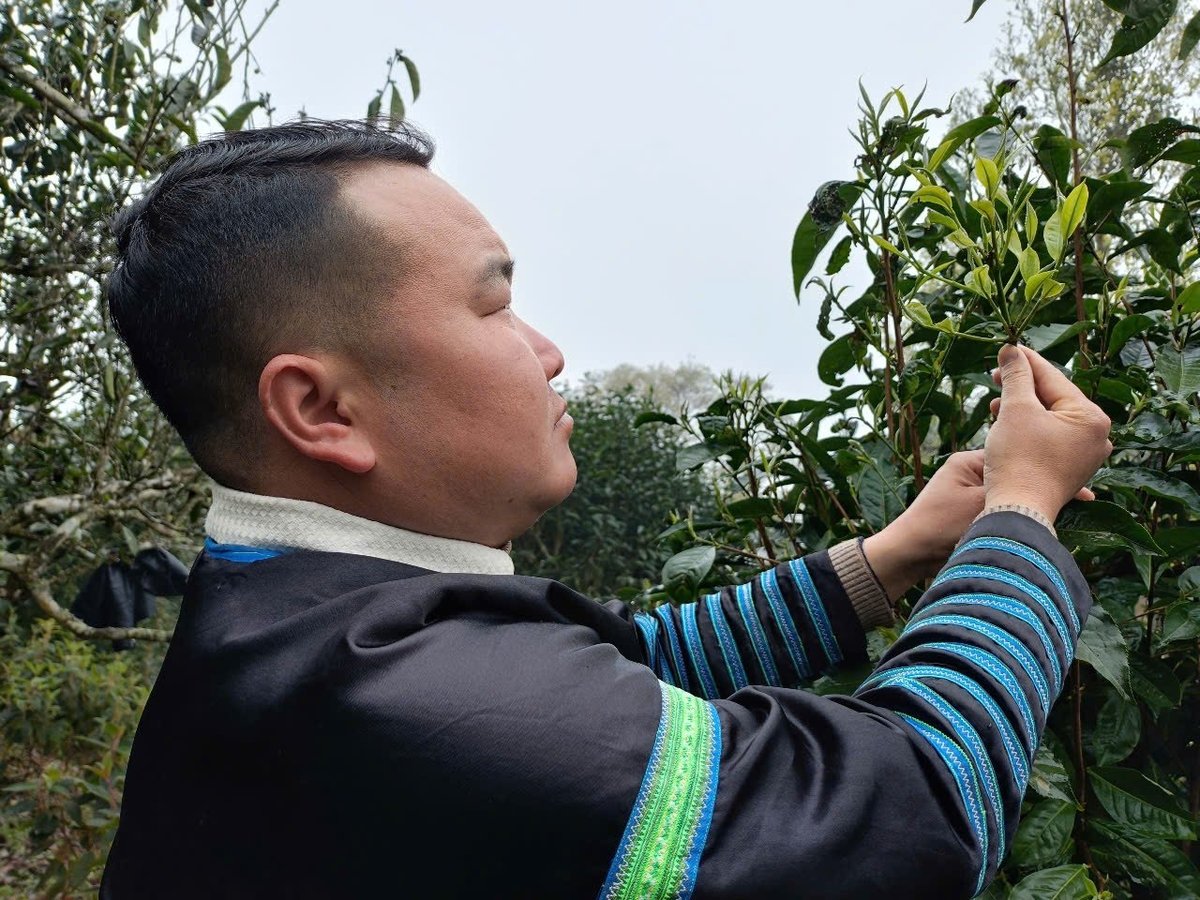
After the cold winter days, with the arrival of spring, the tea buds bloom fresh and vibrant. Photo: Thanh Tien.
Mr. Sung A Tua, with a proud look in his eyes, shared: "These trees are a source of pride for the people of Phình Hồ. They are not only a source of livelihood but also a part of the history and culture of the H'mong people here".
Leaving the mountain peak, the TikToker "commune official" took me to a wooden house nestled on the hillside of Mr. Sung Sau Cua in the Chi Lu village. Inside the spacious house, smoke was rising from the kitchen, and at 104 years old, Mr. Cua was still very sharp, with bright eyes and a kind smile greeting us. By the warm fire, Mr. Cua slowly shared stories from the distant past about this land.
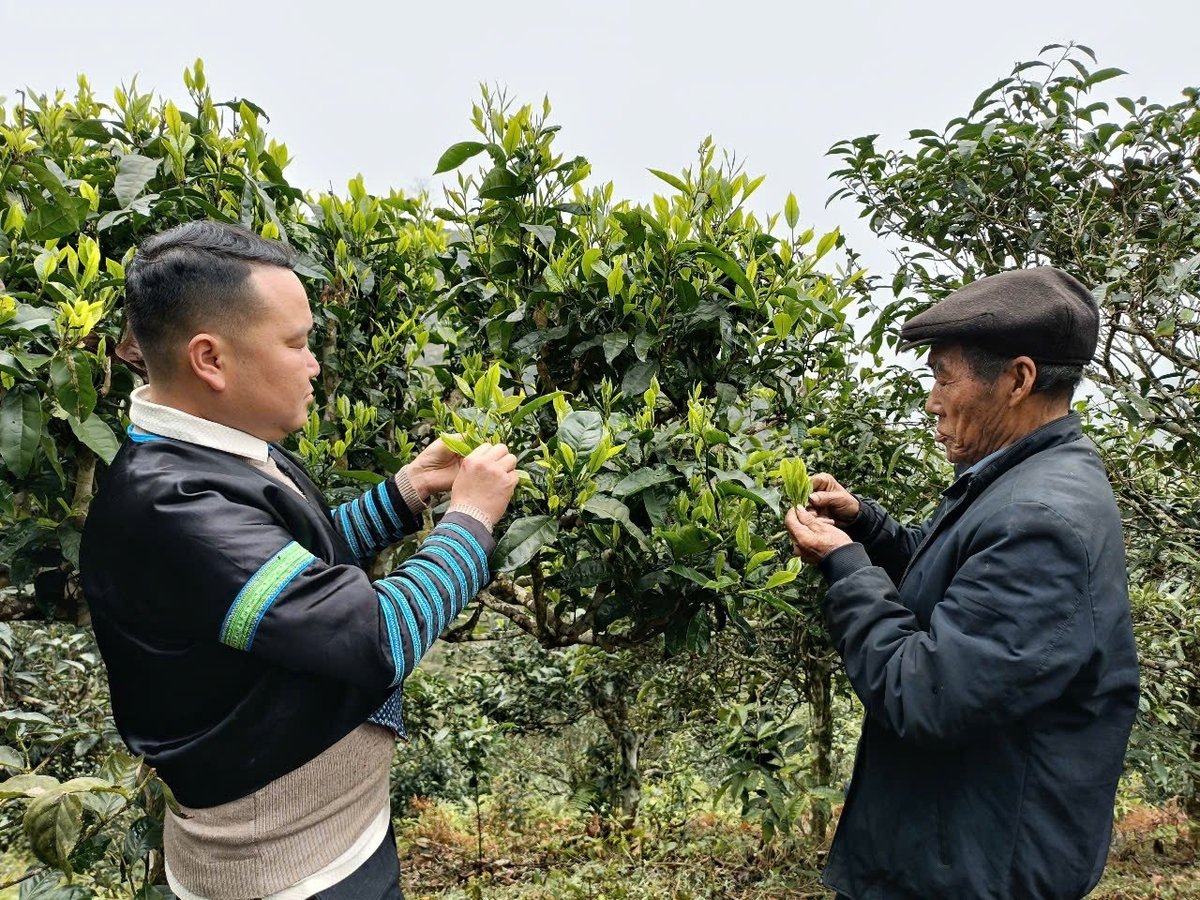
Mr. Cua and the official from Phinh Ho commune visit the ancient tea hill. Photo: Thanh Tien.
In the past, this land was wild, covered with dense forests, and teeming with countless animals. Even then, the Shan Tuyet tea trees here were already large and impressive. For the H'mong people of this area, the Shan Tuyet tea tree is like a precious medicine. The leaves and buds are used to brew tea for daily consumption, helping to cool the body and enhance health, while also being used for bathing and treating skin diseases.
Around 1945, when the country was still engulfed in the flames of war, the French and merchants from the lowlands came to this land during the tea season, when the fresh buds were abundant. They purchased the young tea buds, brought them back, and dried them to make a drink.
Due to the high quality of the tea, Chinese traders also came to buy it directly from the region. In this way, the Shan Tuyet tea tree became an integral part of the lives of generations of the H'mong people. It not only provided income but also served as a bond that connected the community, becoming a part of the unique cultural identity of this mountainous region.
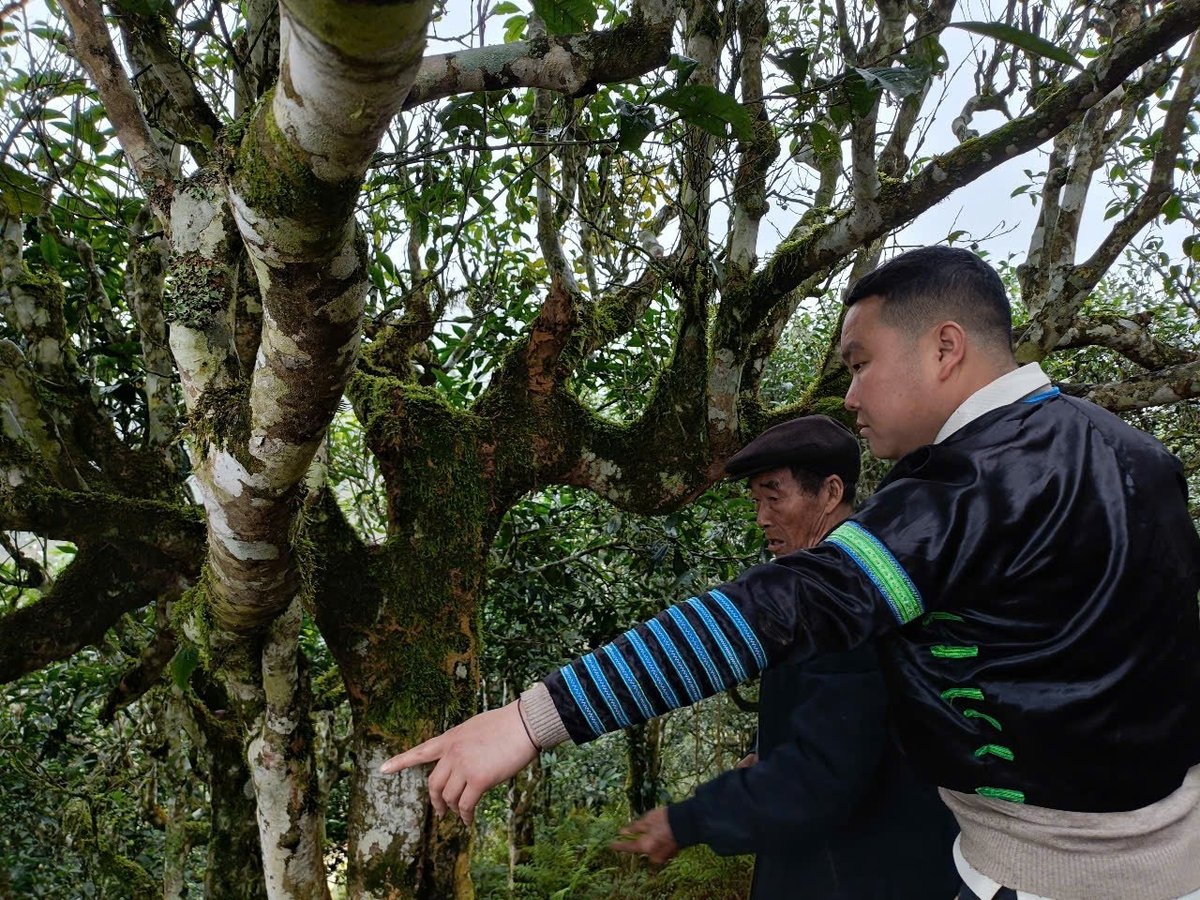
The ancient tea trees with large trunks, covered in moss, in the garden of Mr. Cua's house. Photo: Thanh Tien.
Mr. Cua shared further that he doesn't even know exactly how much tea land he owns, as when his sons grew up and got married, he gave each of them a tea hill as a dowry. Thanks to the Shan Tuyet tea trees, the lives of the people in Phinh Ho have become increasingly prosperous and full. The wooden houses have been reinforced, the children are able to attend school, and the lives of the families are much less hard than before.
Phinh Ho currently has nearly 200 hectares of ancient Shan Tuyet tea trees, concentrated in the villages of Ta Chu, Phinh Ho, and Chi Lu. The locals are actively planting new tea trees and expanding the area to meet the growing demand of the market. What’s remarkable is that the tea in Phinh Ho is entirely cared for by the H'mong people using natural methods, following organic production principles. Every year, the villagers only trim the branches, clear the weeds, and harvest the tea, without using chemical fertilizers or pesticides.
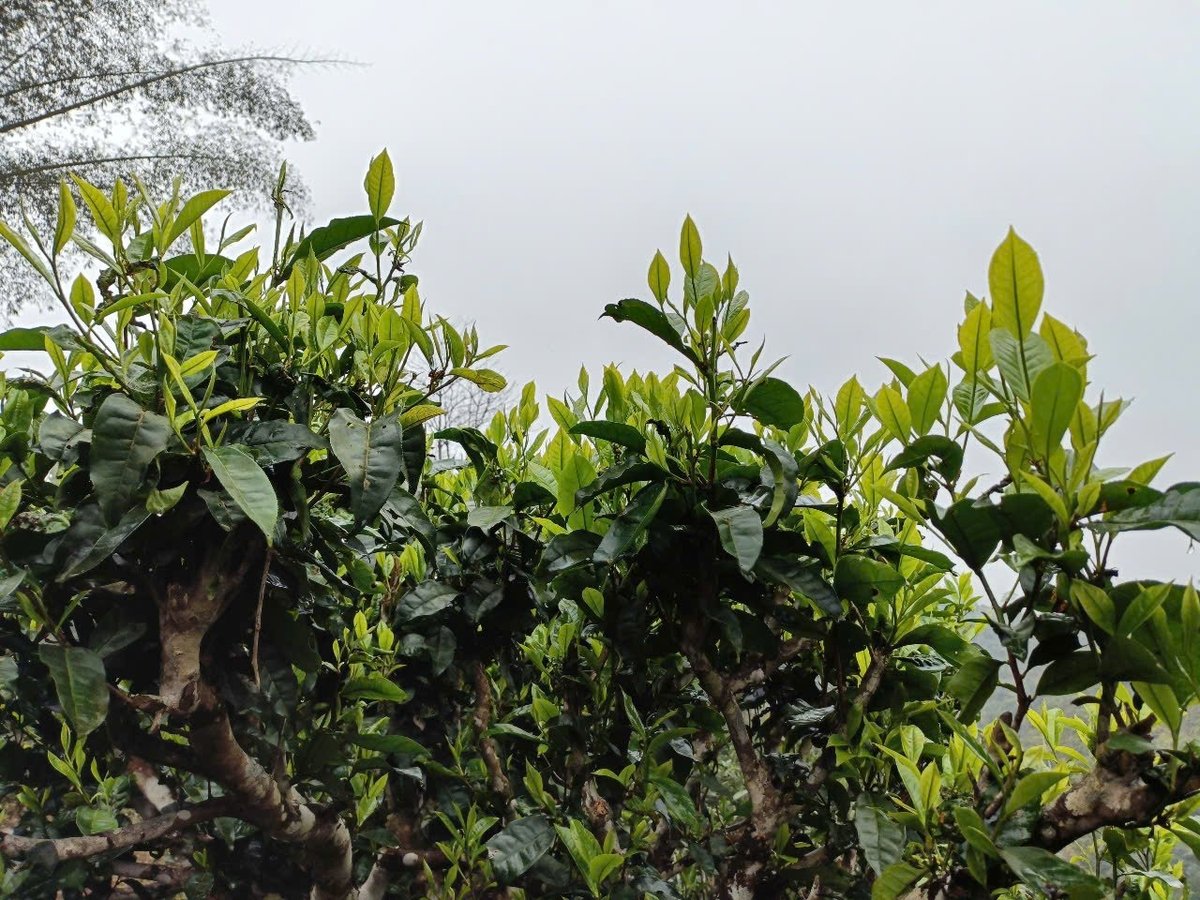
Shan Tuyet tea is cultivated by the locals following organic production principles, ensuring its excellent quality. Photo: Thanh Tien.
Livestock is also highly restricted from entering the tea garden to protect the purity and quality of the tea. This traditional cultivation method not only helps protect the environment but also produces safe tea products with distinctive flavors and high nutritional value.
Mr. Sung A Tua, who accompanied us throughout the trip and is also an active member of the Phinh Ho Shan Tuyet Tea Cooperative, shared that the cooperative is currently working closely with local families who have ancient tea groves to guarantee product supply.
The entire process, from plucking the tea buds, storing, transporting, to processing and packaging, is strictly controlled to ensure the highest quality for every product. The cooperative is focusing on producing four main types of tea: Black tea, Green tea, White tea, and Pu-erh tea. Each type has its own unique flavor and characteristics, processed with careful and meticulous methods.
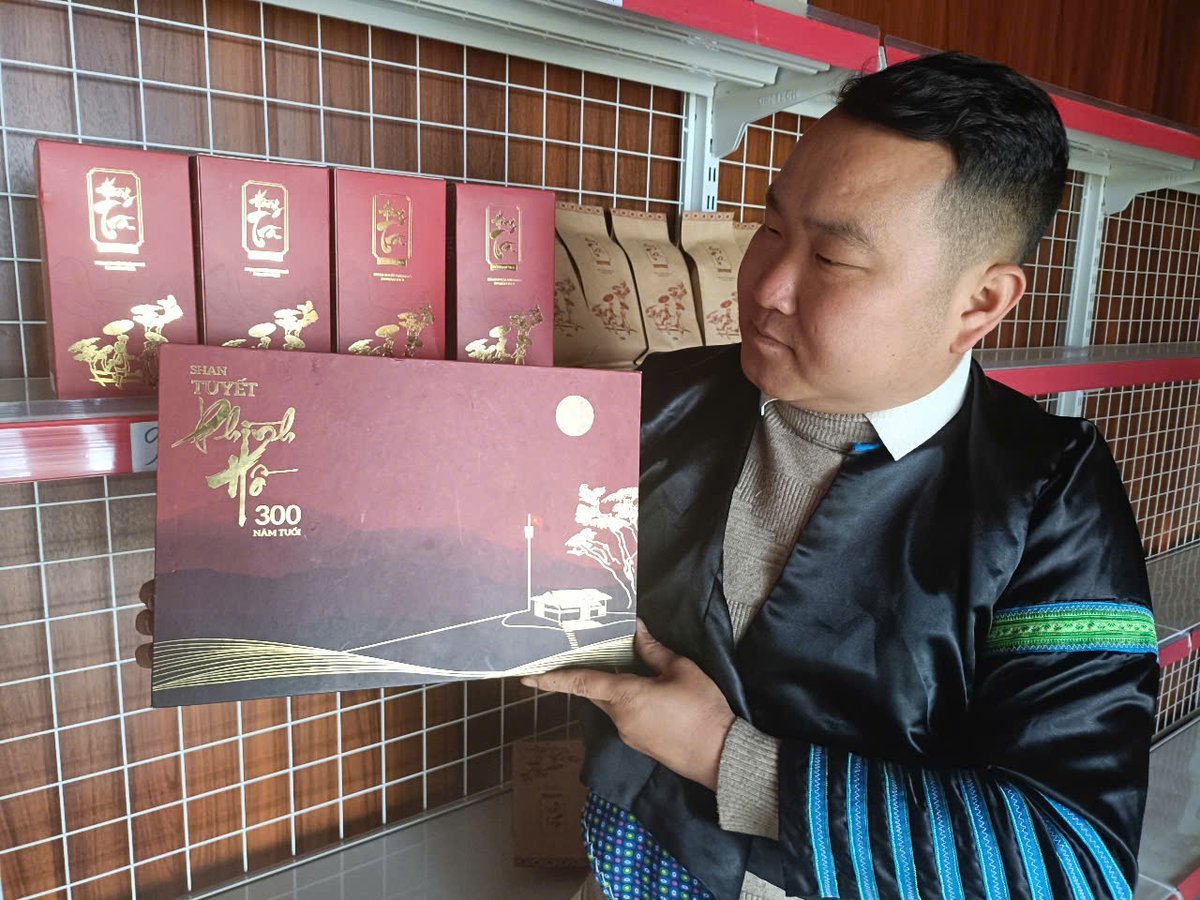
HTX Tra Shan Tuyet Phinh Ho has produced several tea products that meet the OCOP standards. Photo: Thanh Tien.
HTX Tra Shan Tuyet Phinh Ho has successfully developed products that meet the OCOP 3-star standards of Yen Bai Province. The cooperative's next goal is to further enhance the quality of its products, improve packaging designs, and complete all necessary certifications to achieve the prestigious OCOP 5-star certification, which is the highest standard in the OCOP program. This certification will help elevate the reputation of Shan Tuyet tea, allowing it to expand into international markets.
With high-quality Shan Tuyet tea products that embody the distinctive flavors of the highlands of Yen Bai, HTX Tra Shan Tuyet Phinh Ho is nurturing an ambitious vision to penetrate large international markets such as South Korea, Japan, the United States, and European countries. This goal represents not only an opportunity to enhance the value of the tea tree, ensuring a stable and sustainable income for the local people, but also a chance to introduce and celebrate the image, culture, and natural beauty of the Phinh Ho region to the global community.
Translated by Phuong Linh

(VAN) Khanh Hoa is investing over 545 billion VND to develop 240 hectares of high-tech marine aquaculture in order to guarantee a consistent supply of seafood exports and achieve the USD 1 billion target.

(VAN) Minister of Agriculture and Environment Do Duc Duy held a meeting with Soopakij Chearavanont, Chairman of C.P. Group, on May 15.
/2025/05/16/3800-0-nongnghiep-143756.jpg)
(VAN) Suntory PepsiCo Vietnam coordinated with the Ministry of Education and Training to implement an education program on water conservation, reaching nearly 1 million primary school students nationwide.

(VAN) Vietnam’s TH Group officially put its high-tech fresh milk processing plant into operation in the Russian Federation, marking a historic moment as the first TH true MILK cartons were produced in Russia.

(VAN) Use of high-quality broodstock and biotechnology is regarded as the most effective approach to ensuring sustainable and economically viable shrimp aquaculture ahead of climate change and the emergence of increasingly intricate disease patterns.

(VAN) Carbon farming is a form of agricultural practices that helps absorb more greenhouse gases than it emits, through smart management of soil, crops, and livestock.

(VAN) This is a key content of the Memorandum of Understanding recently signed between the Vietnam Fisheries Society and Kunihiro Inc of Japan.